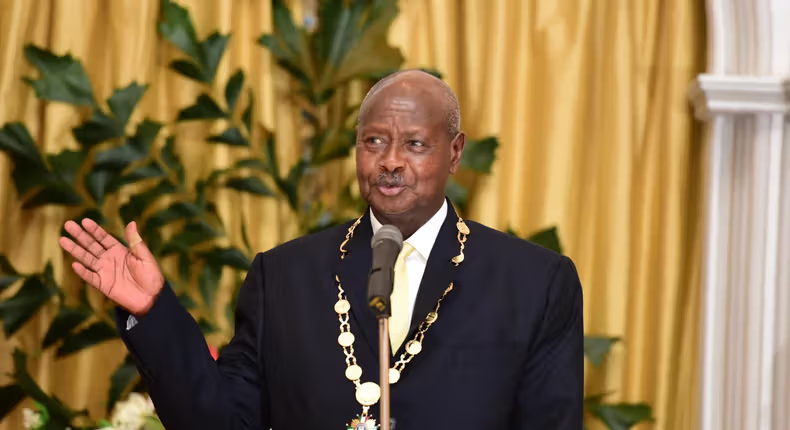KAMPALA, Uganda (BN24)— President Yoweri Museveni has signed into law new legislation reinstating military trials for civilians, Uganda’s parliament announced on Monday, setting the stage for a fresh legal and political showdown over the treatment of opposition figures and the separation of powers in the East African nation.

The move directly defies a Supreme Court ruling issued earlier this year, which had deemed the military prosecution of civilians unconstitutional and ordered an end to the long-standing practice. That landmark verdict had forced the government to transfer several high-profile political cases, including those involving opposition leader Kizza Besigye, from military to civilian courts.
In an official post on X, formerly Twitter, Uganda’s parliament confirmed Museveni had signed the Uganda Peoples’ Defence Forces (Amendment) Act, 2025, which was passed last month. The legislation provides a legal framework for military courts to once again try civilians, particularly in cases involving the alleged use of firearms in political violence.
The reintroduction of military tribunals has been widely condemned by human rights organizations and opposition leaders, who argue the law violates constitutional protections and serves primarily as a tool to intimidate and silence government critics. They also contend that the move could trigger another constitutional challenge.
“Reinstating military trials for civilians after the highest court declared them unlawful is not just a constitutional crisis—it’s a direct threat to Uganda’s fragile democratic framework,” said one Kampala-based legal rights advocate, speaking on condition of anonymity.
Opposition figures have repeatedly accused Museveni’s government of using military courts as a parallel justice system to persecute critics under the guise of national security. The 79-year-old president, who has ruled Uganda since 1986, has long defended the use of military tribunals for what he calls “grave offenses involving weapons.”
Government officials argue that the legislation is necessary to prevent the rise of “militant political groups” and maintain public order. After the bill’s passage, the Ugandan army’s spokesperson lauded the measure as a deterrent against groups seeking to subvert the democratic process.
The debate over military trials has deep political roots in Uganda. In the past, opposition leader Kizza Besigye was tried in a military court for treason and weapons charges—until court orders forced the trial to be moved to civilian jurisdiction. Likewise, Robert Kyagulanyi, known widely as Bobi Wine, was once charged in a military tribunal over alleged illegal gun possession—a case that was later dropped amid international pressure.
Bobi Wine, a pop star-turned-opposition leader, is expected to challenge Museveni in the 2026 elections and remains a vocal critic of state repression. His arrest, alleged torture, and surveillance by security forces have turned him into a symbol of youth-led resistance in a country where more than 75 percent of the population is under the age of 30.
Legal analysts say the newly signed law is likely to face immediate challenges in court, especially if Ugandan citizens or rights organizations file a petition citing the recent Supreme Court decision. “This sets up a constitutional confrontation between the executive, the military, and the judiciary,” said a Ugandan constitutional law scholar.
The Supreme Court ruling that banned military trials of civilians had been based on prior legislation that the court found to be incompatible with Uganda’s constitution. Museveni’s government, in response, introduced a revised legal framework aimed at sidestepping that ruling—a move critics say undermines judicial independence.
With tensions rising ahead of the 2026 general elections, the passage of the UPDF Amendment Act may fuel further unrest and deepen the sense of democratic backsliding in Uganda.
Rights organizations and international observers are now watching closely to see how Uganda’s courts respond—and whether the law will stand up to renewed judicial scrutiny.



